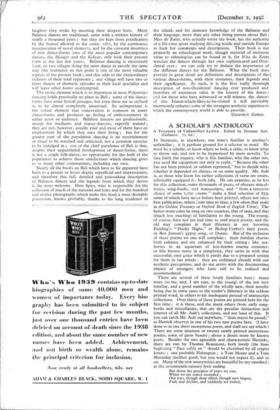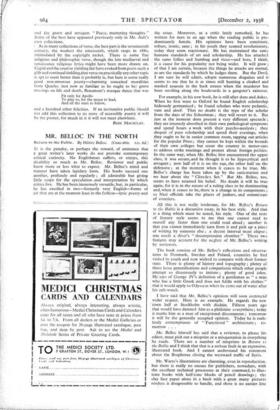Treasury of Unfamiliar Lyrics. Edited by Norman Ault.
A SCHOLAR'S ANTHOLOGY
(Gollancz. 7s. 6d.) _
IN literature, as elsewhere, one man's familiar is anotherls unfamiliar ; it is perilous ground for a selector to tread. He must be a scholar; th know where .te look, a critic, to know what to throw out, and not to be hypnotised by mere novelty. To
face- fairly the inquiry, why is this familiar, why the other not, you need the equipment not only to reply, " Because the other has not been printed, or seldom reprinted," but to decide why, , whether it depended on-chance, or on some quality. Mr. Ault is, as those who know his earlier collections of verse are aware, admirably equipped fci: both jobs. He can examine, as he his for this collection, some thousands of poets, of obscure miscel- lanies, song-books, and manuscripts, and ." from a tentative choice of some 1,7oo -poems "-make a final selection of 833, some of which have never before been printed, others not since
first publication, others Iron time to time, a.few often (but none in the Golden Treasury or Oxford BOok of English Verse). The
better-worn coins he rang on two counters, that-of taste, and that . (much less exacting) of familiarity to the young. The young, of course, have not yet had time to read much poetry, and the Old may complain at their illiteracy in not knowing Fielding's " Dusky Night," or Bishop Corbet's fairy poem, or Ben Jonson's gypsy song, or Donne. But of the inclusion of these poems no one will complain ; their familiar charms both enhance and are enhanced by their setting ; like sea- horses in an aquarium of less-known marine creatures, or like known tunes in a symphony, they swim in with that successful, easy grace which is partly due to a prepared setting for them in our minds : they are ordinated already with our aesthetic perceptions, and do not arrive with the disconcerting impact of strangers who have still to be realised and accommodated.
There are several of these lovely familiars here ; many more (to me, and, I am sure, to the young) of the not very familiar, and a good number of the wholly new, their novelty being due in some cases to the reader's illiteracy in the seldom printed word, in others to his inadequate perusal of manuscript collections. Over thirty of these poems are printed here for the first time ; it is these, and the many others from early song- books and miscellanies, that are the peculiar distinction and interest of all Mr. Ault's collections, and not least of this. If you can catch Mr. Ault out anywhere, " thou mayst be-proud/' as Herrick observes in one of his two new poems here. (I have done so in one short anonymous poem, and shall not say which.) There are some nineteen or twenty newly printed anonymous poems, some of great beauty; about a dozen more by known poets. Besides the two agreeable and characteristic Herricks, there are -two by Thomas Beaumont, both lovely (the- lines beginning " Pace softly on " should be cherished by all crypto lovers) ; one probable Habington ; a Torn Moore and a Tom Macaulay (neither good, but you would not expect it), and so on.. Many of the new anonymities are beautiful by any standard : as the seventeenth-century-lyric-ending _
But down the precipice of years we run, When we are scarce ascended ;
Our joys, though deep allied, though new begun, Fade and decline, and suddenly are ended, and the grave and arrogant " Peace, muttering thoughts." Some of the best have appeared previously only in Mr. Ault'S own collections.
As in many collections of verse, the best part is the seventeenth century, the weakest the nineteenth, which stops in 188o, intimidated by the copyright racket. There is some fine religious and philosophic verse, though the late mediaeval and renaissance religious lyrics might have been more drawn on. Cupid and the cruel or yielding fair have evoked from poets such a glib and continual tinkling,that verse on practically any other topic is apt to seem better than it probably is, but here is some really good non-amorous poetry—charming conceited moralities from Quarles (not now as familiar as he ought to be) grave musings on life and death, Beaumont's masque dance that was
Fit only for Apollo To play to, for the moon to lead, And all the stars to follow, and a hundred other felicities. If an inattentive public 'should not add this collection to its store of accessible poetry it will be the poorer, for much in it it will not meet elsewhere.
ROSE MACAULAY.



























































 Previous page
Previous page